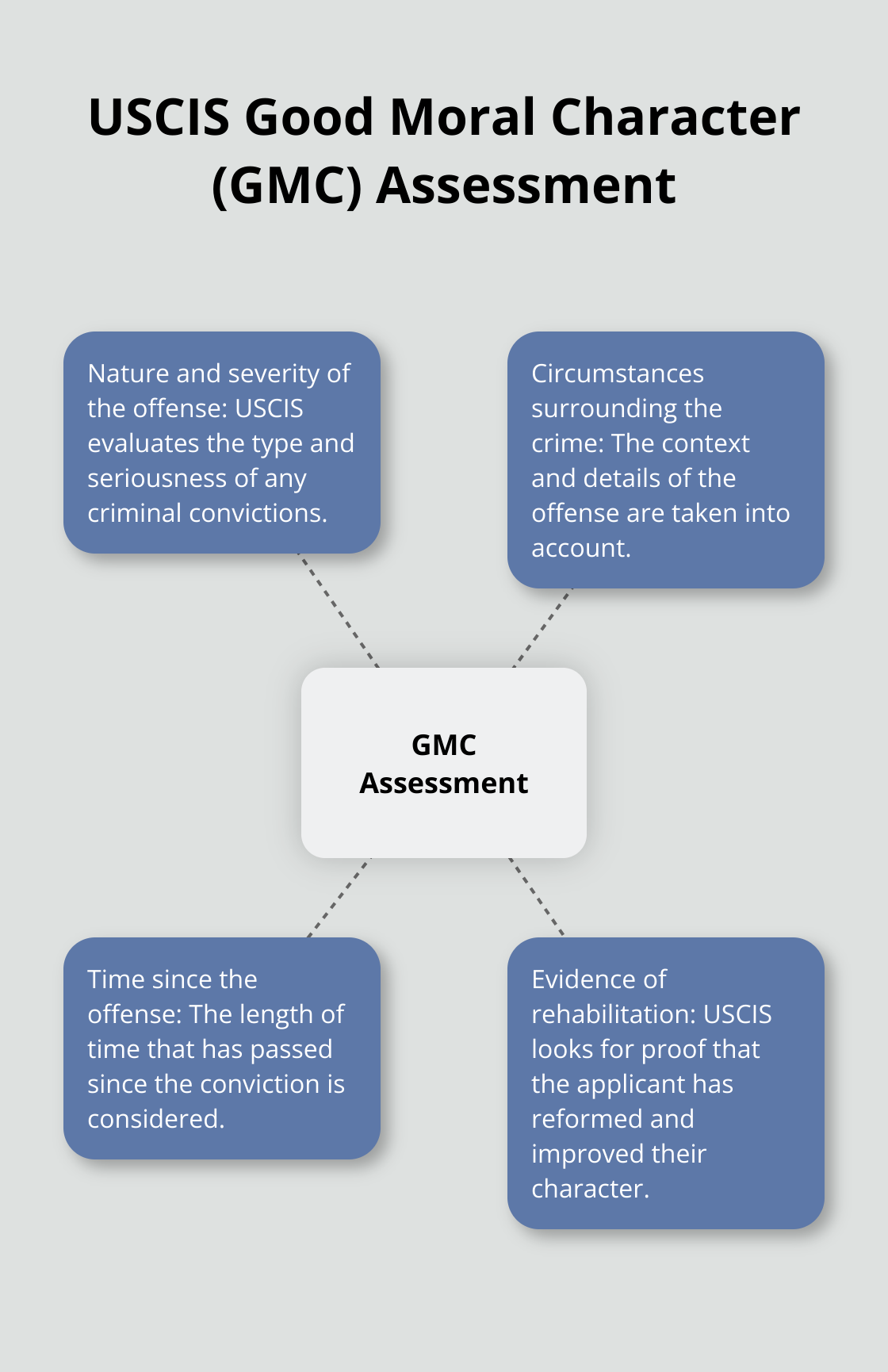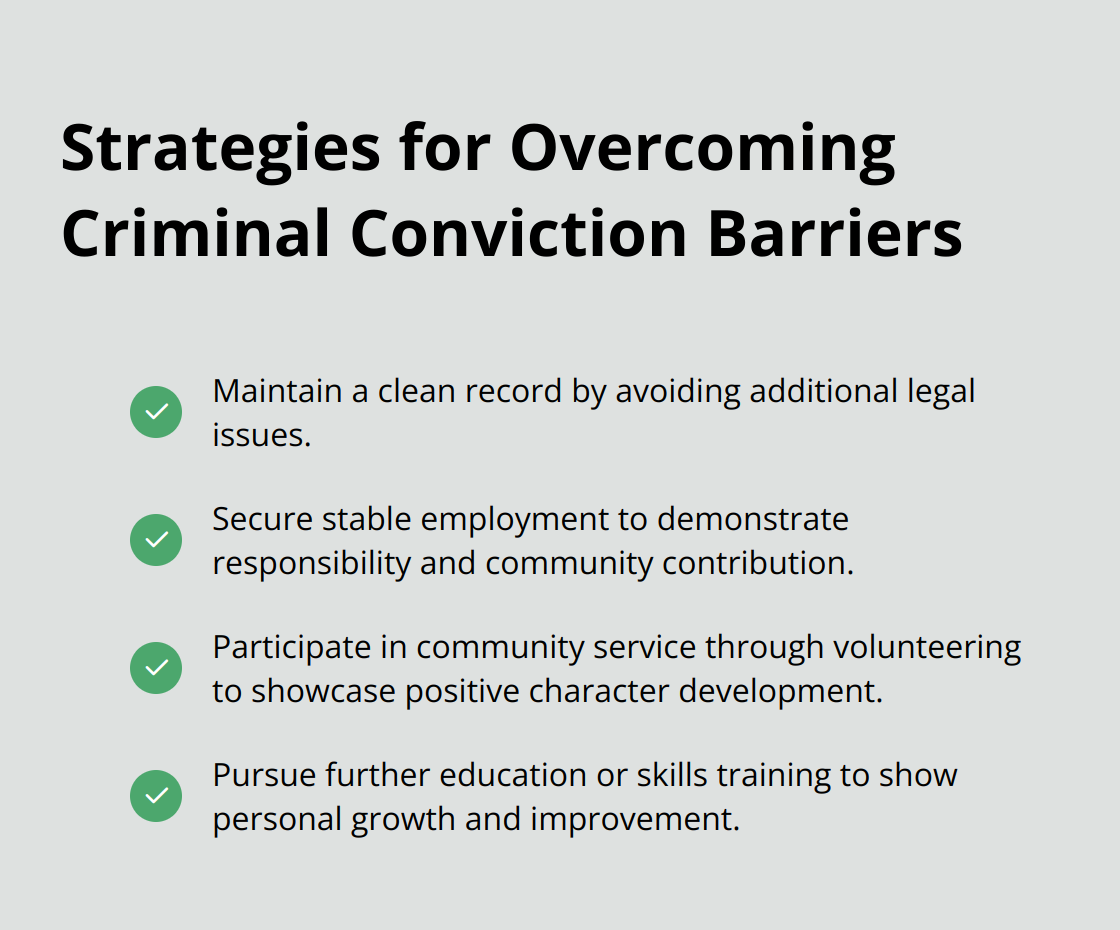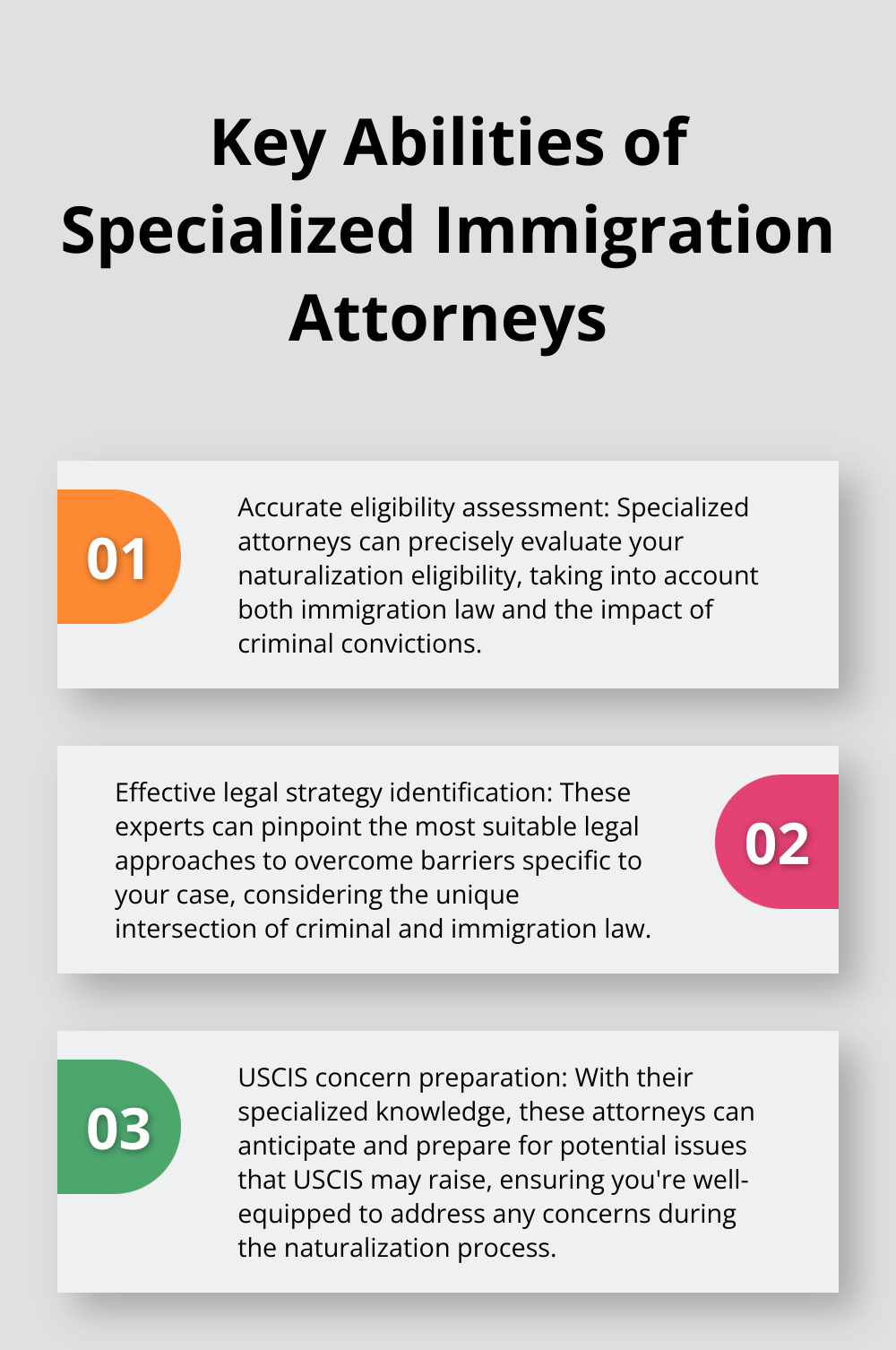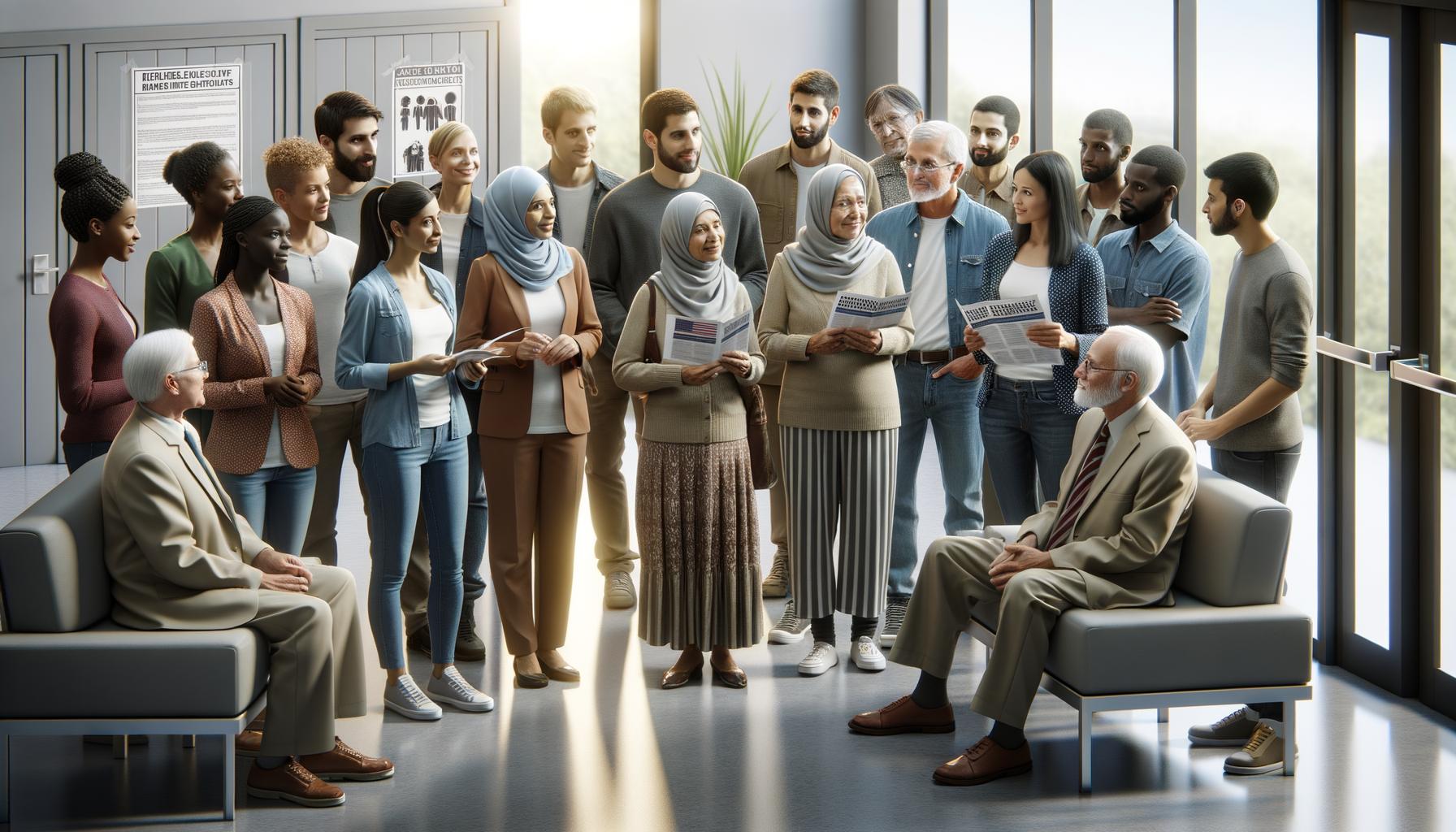
How to Navigate Naturalization with Criminal Convictions?
Navigating naturalization with criminal convictions can be a complex and daunting process. Many aspiring citizens face uncertainty about their eligibility and the potential impact of their past on their immigration journey.
At Law Offices of Jeffrey A. Thompson, we understand the challenges and nuances involved in these cases. Our goal is to provide clear guidance and effective strategies for individuals seeking to overcome criminal conviction barriers and achieve their dream of U.S. citizenship.
How Criminal Convictions Impact Naturalization
Criminal convictions can significantly affect the naturalization process, potentially derailing an individual’s path to U.S. citizenship. Understanding these implications is essential for anyone with a criminal record seeking naturalization.
Types of Criminal Convictions
Not all criminal convictions carry the same weight in immigration law. Minor offenses, such as traffic violations, typically don’t pose significant barriers. However, more serious crimes can have severe consequences:
- Aggravated felonies often result in permanent ineligibility for naturalization. These include crimes like murder, rape, drug trafficking, and certain theft or violent crimes with a prison sentence of at least one year.
- Crimes involving moral turpitude (CIMTs) raise red flags. These offenses violate moral standards and typically involve intent to defraud, steal, or harm others. Examples include fraud, theft, and certain assault charges. In some cases, a single CIMT conviction will not make a noncitizen inadmissible and/or deportable.
Good Moral Character Requirement
U.S. Citizenship and Immigration Services (USCIS) requires naturalization applicants to demonstrate “good moral character” (GMC) for a specified period, usually five years preceding the application. Criminal convictions directly impact this assessment.
USCIS considers various factors when evaluating GMC:

- The nature and severity of the offense
- The circumstances surrounding the crime
- The length of time since the offense occurred
- Evidence of rehabilitation
It’s important to note that even if a conviction falls outside the statutory period, USCIS may still consider it as part of the overall GMC assessment. In general, the applicant must show GMC during the five-year period immediately preceding his or her application for naturalization and up to the time of the oath of allegiance.
Temporary vs. Permanent Bars
Some convictions result in temporary bars to naturalization. For example, a single conviction for a controlled substance offense (except for simple possession of 30 grams or less of marijuana) typically bars an applicant for five years from the date of the offense.
Other convictions lead to permanent bars. These include:
- Murder convictions at any time
- Aggravated felony convictions on or after November 29, 1990
- Persecution, genocide, or severe violations of religious freedom while serving as a foreign government official
In cases of temporary bars, applicants must wait until the specified period has passed and then demonstrate good moral character during that time before applying for naturalization.
The complexities of naturalization with a criminal record require expert guidance. Specialized attorneys can help clients understand their eligibility, overcome potential barriers, and present the strongest possible case for naturalization. Their experience in both immigration and criminal law allows them to provide comprehensive support throughout this challenging process.
As we move forward, we will explore strategies for overcoming these barriers and navigating the naturalization process successfully, even with a criminal history.
Strategies for Overcoming Criminal Conviction Barriers
Leveraging Time and Rehabilitation
After a conviction, time becomes a valuable asset. USCIS examines the five-year period before your application to evaluate good moral character. Use this time effectively:
- Maintain a clean record: Avoid additional legal issues.
- Secure stable employment: Demonstrate responsibility and community contribution.
- Volunteer: Participate in community service to showcase positive character development.
- Education: Pursue further education or skills training.
Document these efforts meticulously. Collect letters from employers, volunteer coordinators, and community leaders as powerful evidence of your rehabilitation.

Exploring Waivers and Pardons
In certain situations, waivers or pardons may help overcome specific convictions:
- Form I-601 Waiver: This waiver can address certain grounds of inadmissibility (including some criminal convictions).
- Pardons: State or federal pardons potentially remove immigration consequences for certain convictions. However, the process is complex, and success rates vary significantly by jurisdiction.
These options require expert legal guidance. An experienced immigration attorney can evaluate your eligibility and guide you through the intricate application process.
Embracing Full Disclosure and Honesty
Transparency is essential in the naturalization process. USCIS performs thorough background checks, and attempts to conceal information lead to severe consequences:
- Disclose all arrests and convictions (even if expunged or sealed).
- Provide certified court dispositions for all criminal cases.
- Prepare to explain the circumstances of each incident during your interview.
A 2019 DHS report revealed that an applicant may be found to lack good moral character and have their naturalization application denied without DHS issuing a Notice to Appear.
USCIS officers receive training to identify inconsistencies. Honesty, combined with evidence of rehabilitation, offers the best strategy for overcoming past mistakes.
Implementing Tailored Legal Strategies
Cookie-cutter approaches often fall short in these complex cases. Personalized strategies should consider:
- The nature and timing of your convictions
- Your rehabilitation efforts
- Your overall immigration history
- Current USCIS policies and trends
For example, a client with a 10-year-old DUI conviction might successfully naturalize by presenting compelling evidence of rehabilitation (e.g., years of sobriety, steady employment, and community involvement).
As we move forward, we’ll explore the critical role of legal representation and expert guidance in navigating this complex process. An experienced immigration attorney can provide invaluable support throughout your journey to citizenship.
Legal Representation: Your Key to Naturalization Success
The Importance of Specialized Knowledge
Immigration attorneys with experience in criminal law possess a unique skill set for your case. They understand the intersection of criminal convictions and immigration consequences, often called “crimmigration.” This specialized knowledge allows them to:

A conviction for a felony immigration and naturalization offense can increase the severity level by 2 levels, and two or more convictions for felony immigration offenses can have even more serious consequences.
Crafting a Compelling Case
An experienced attorney does more than complete forms; they create a narrative that presents your case optimally. This process involves:
- Collection and organization of all relevant documents
- Preparation of detailed explanations for past convictions
- Emphasis on rehabilitation evidence and good moral character
Expert Navigation of USCIS Procedures
The naturalization process includes multiple steps (each with its own set of rules and potential challenges). An attorney guides you through:
- Proper completion of the N-400 application
- Responses to Requests for Evidence (RFEs)
- Preparation for the naturalization interview and civics test
Your attorney can accompany you to the USCIS interview, which provides support and clarification if needed. This presence often reduces stress and protects your rights throughout the process.
Maximizing Your Chances of Success
Legal representation significantly improves your odds of a successful naturalization application. Attorneys can:
- Identify potential issues before they become problems
- Develop strategies to address concerns proactively
- Present your case in the most favorable light possible
The Value of Local Expertise
An attorney familiar with local USCIS offices and procedures can provide invaluable insights. They understand:
- Local trends in application processing
- Specific concerns of local USCIS officers
- Effective strategies that work in your jurisdiction
At Law Offices of Jeffrey A. Thompson, we combine our deep understanding of immigration law with local expertise to provide our clients with the best possible representation.
Final Thoughts
Naturalization and criminal convictions present unique challenges, but many aspiring citizens can overcome them. Time becomes a powerful ally when applicants use it to build a strong case of good moral character. Transparency and honesty remain essential throughout the naturalization process, demonstrating integrity and personal growth to USCIS.
The complexities of immigration law, especially when intertwined with criminal matters, highlight the need for expert legal representation. An experienced immigration attorney can provide invaluable assistance in navigating USCIS procedures and addressing potential concerns. U.S. citizenship offers life-changing benefits, including voting rights and protection from deportation.
We at Law Offices of Jeffrey A. Thompson specialize in guiding clients through complex immigration matters (including naturalization cases involving criminal convictions). Our team combines legal knowledge with personalized service to help you achieve your American dream. Don’t let uncertainty hold you back; with the right preparation and support, you can overcome past mistakes and pursue U.S. citizenship.


